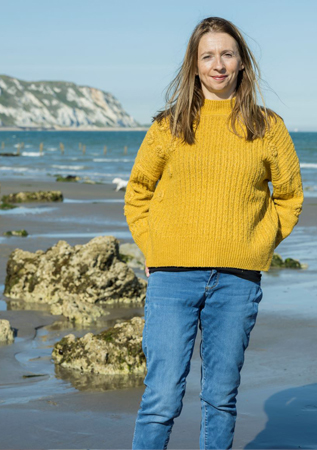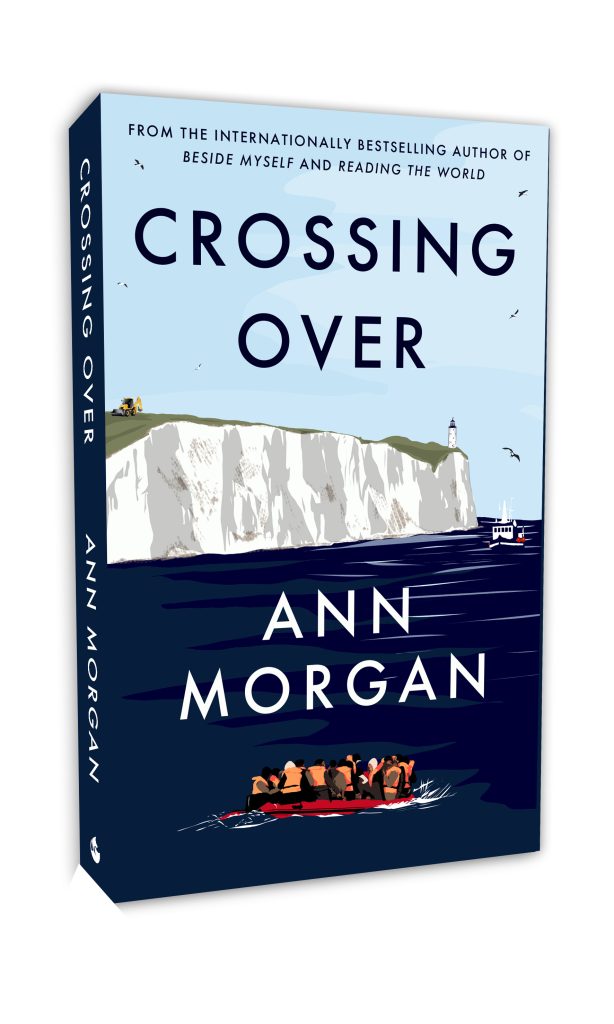An interview with Ann Morgan


Ann Morgan is an author, speaker and editor based in Folkestone. Ann’s writing has been published widely, including in the Guardian, Independent and Financial Times, and by the BBC. In 2012, she set herself the challenge of reading a book from every country in a year – a project that led to a TED talk and to the non-fiction book Reading the World: How I Read a Book from Every Country. Her debut novel, Beside Myself, has been translated into eight languages. Crossing Over, her latest novel, draws on her experience living just a few minutes from where many of the small boats crossing the Channel land. She is Literary Explorer in Residence of the Cheltenham Literature Festival for 2022 and 2023.
We caught up with Ann as part of the blog tour for Crossing Over.
What inspired you to write Crossing Over?
For years I’d wanted to write about the 1940 Little Ships Operation Dynamo mission. I found the idea of ordinary people risking their lives to bring soldiers back from Dunkirk during World War Two very moving, yet I also suspected that the story was somewhat idealised in the national imagination. Then, in 2016, I moved to Folkestone and started to hear about small boats of migrants crossing the English Channel. I knew about the tragedies in the Mediterranean and had been particularly moved by the BBC Exodus documentary series, which featured a number people who had made the treacherous journey to Europe. Surely it wouldn’t be long before such crossings became a common occurrence closer to home? At the same time, the rhetoric around immigration was hardening in parliament and in the media. I wondered what it would be like to write a story that brought these two very differently regarded kinds of Channel crossings together. Crossing Over was the result.
Are there any main themes or points you want the reader to take away from your book?
My main aim is to put the humanity back into the story of what is happening here. It’s too easy to retreat into statistics. But history is made up of people’s lives. That’s not to dismiss the difficulty of addressing some of the issues around immigration, but I think the decisions we take personally and nationally should keep the humanity of those involved in mind.
Which other writers do you most admire and why? Are there any books which have changed your life?
I love a huge range of writers from around the world. But a couple of authors whose work I keep coming back to are the Japanese author Mieko Kawakami (translated by Sam Bett and David Boyd) and the British-Tanzanian Nobel laureate Abdulrazak Gurnah. I love Kawakami because of the humour and beauty in her writing, and the way she tackles taboos and extremes. I discovered Gurnah’s work in 2012. He was my Tanzanian choice for my A Year of Reading the World project (
Are there any books which have changed your life?
The 197 books I read during my Year of Reading the World collectively changed my life. Not only did that project lead to my first published book (Reading the World: How I Read a Book from Every Country), but reading such an inspiring and mind-expanding range of stories opened up my fiction writing. I was able to be much more fearless as a writer, and much more alive to the complexity and richness of other lives. It’s one of the reasons why reading the world is now a lifelong endeavour for me. I continue to update the blog with recommendations every month.
What’s the best piece of writing advice you’ve ever received?
Oh crumbs. I’m not very good at listening to advice. A famous crime writer once told me: ‘This is the baton you must carry on: excessive drinking and booksellers who kick you in the face.’ Needless to say, we were already doing the first of the two when he said this.
If you could offer a budding writer one piece of advice, what would it be?
Keep going.
What drew you to your genre?
It’s what comes out when I sit down to write. And I suppose it’s mostly what I read. (Although I think genres are made up.)
What’s the strangest job (besides writing) that you’ve ever had?
A professional mourner, although not by choice. I used to be a freelance choral singer, and would regularly sing at people’s weddings and funerals. But at one funeral, I was told to sit in the congregation and say I was a friend of the family. It made me wonder how many of the other people there were also being paid…
Where do you write?
I’m very lucky to have my own writing room, looking out at the White Cliffs.
What’s the best place to read?
I get a lot done on my exercise bike. It’s a useful barometer for telling how good a book is. When a story really grabs me, I don’t notice the minutes passing.
You’re hosting a literary dinner party. Which famous writer (from any point of history) do you invite?
Well, the writer I’d most like to meet is the Togolese explorer Tété-Michel Kpomassie, an extraordinary man, who ran away from home as a teenager and went to live with the Inuit in Greenland. He wrote the amazing memoir An African in Greenland (translated by James Kirkup), and it was my Togolese choice back in 2012. Luckily, it looks as though I will get my wish to meet him later this year, although the event hasn’t been announced yet, so I can’t share details for now…
What’s the background music at your dinner party?
I tend to be too flustered thinking about the logistics to remember to put music on. But I am partial to a spot of Joni Mitchell.
Any outlandish hobbies?
No. I was a campanologist as a teenager but I haven’t done it for years.
What’s next?
Another novel. (I’ve got several in the works at the moment.) And developing more of my reading workshops, which are designed to help curious booklovers read outside their comfort zones. I’m also looking forward to returning to the Cheltenham Literature Festival for another year as Literary Explorer in Residence.
Edie finds the world around her increasingly difficult to comprehend. Words are no longer at her beck and call, old friends won’t mind their own business and workmen have appeared in the neighbouring fields, preparing to obliterate the landscape she has known all her life. Rattling around in an old farmhouse on the cliffs, she’s beginning to run out of excuses to stop do-gooders interfering when one day she finds an uninvited guest in the barn and is thrown back into the past.
Jonah has finally made it to England – where everything, he’s been told, will be better. But the journey was fraught with danger, and many of his fellow travellers didn’t make it. Sights firmly set on London, but unsure which way to turn, he is unprepared for what happens when he breaks into Edie’s barn.
Haunted by the prospect of being locked away and unable to trust anyone else, the elderly woman stubbornly battling dementia and the traumatised illegal immigrant find solace in an unlikely companionship that helps them make sense of their worlds even as they struggle to understand each other. Crossing Over is a delicately spun tale that celebrates compassion and considers the transcendent language of humanity.













